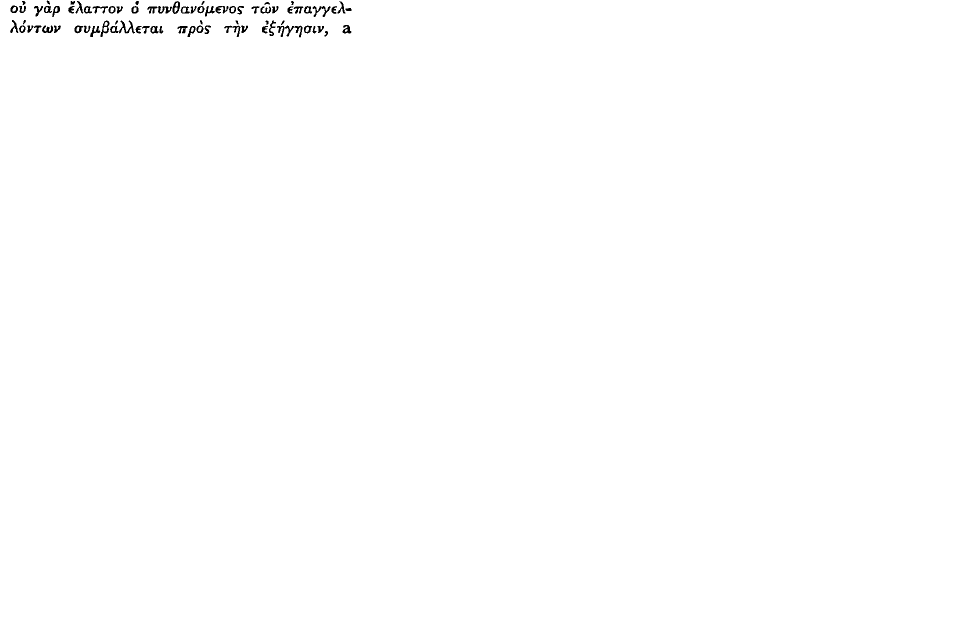Article contents
Some Questions About Historical Writing in the Second Century B.C.
Published online by Cambridge University Press: 11 February 2009
Extract
Of the early Roman historians who wrote in Greek, A. Postumius Albinus was not necessarily alone in realizing that his Greek was not the best Greek; while, on the other hand, Cato and those who followed the new fashion of writing in Latin would have resented, we may assume, could they have foreknown, the statement of Q,. Catulus in Cicero's De Oratore that they had no literary or rather ‘oratorical’ merit; though Cato might have approved Catulus' caustic comment on Roman historical writing, ‘Satis est non esse mendacem’. That an historian should not, consciously and deliberately, lie all second-century historians would no doubt have agreed; and they would have endorsed Polybius' condemnation of  masquerading as history in a story whose falseness was self-evident, because it assumed, on the part of the young sons of senators at Rome, a gravitas such as no young boy could possibly possess.
masquerading as history in a story whose falseness was self-evident, because it assumed, on the part of the young sons of senators at Rome, a gravitas such as no young boy could possibly possess.
- Type
- Research Article
- Information
- Copyright
- Copyright © The Classical Association 1953
References
page 158 note 1 P(olybius) 39. 1. 4 f.Google Scholar
page 158 note 2 2. 51.
page 158 note 3 Ibid.
page 158 note 4 P. 2. 56. 10 ff. (in criticism of Phylarchus); 12. 7. 6; 12. 11. 8; 12. 12. 4ff.; 12. 25b. 4 (all four passages in criticism of Timaeus); 36. 1. 7. Polybius thought that speeches should be reported as accurately as events (12. 25i 8; cf. 2. 56. 10 ff.; 12. 25b. 4; 36. 1. 7). I cannot follow the statement of Walbank, F. W., CQ. xxxix (1945), 10,Google Scholar n. 4, that Polybius ‘drew no clear distinction between the actual words spoken and 
 ’. The phrase (which, in my opinion, means something like ‘the relevant and vital arguments’) has nothing at all in common with
’. The phrase (which, in my opinion, means something like ‘the relevant and vital arguments’) has nothing at all in common with 
 of 2. 56. 10, but is to be read in its context—an injunction to the historian three sentences later (12. 25n. 8) to record
of 2. 56. 10, but is to be read in its context—an injunction to the historian three sentences later (12. 25n. 8) to record 
Polybius would have agreed readily that, as well as educating politicians, pointing a moral was a function of history, and knew as well as anybody that the historian must be selective with his facts (just as with his speeches-12. 251. 5 
 ). What he says over and over again is that the historian must not invent either facts or speeches ‘so as to fit his theme’ (2. 56. 10), i.e. so as to give substance to his theories. That is what the tragedian does, in contrast to the historian. This perfectly lucid theory of history has no connexion with Polybius’ other view (also perfectly understandable) that the fear inspired by the State religion at Rome (which was palpably full of falsifications) was a large element in the disciplined life which Polybius admired as distinguishing contemporary Rome from contemporary Greece, the rising from the disintegrating State (6. 56. 6 ff.). Walbank's remark (C.Q. xxxix. 10) that the connexion between the improving effect of Religion and of History ‘drawn by Diodorus in a prologue (1. 2. 2) which is very reminiscent of Polybius … shows how very much moral aims governed Polybius both as a citizen and as a historian, and how very far he was from applying in practice the criterion of objective, unvarnished truth’, is, I confess, unintelligible to me. Why should the sins of Diodorus be visited on Polybius?
). What he says over and over again is that the historian must not invent either facts or speeches ‘so as to fit his theme’ (2. 56. 10), i.e. so as to give substance to his theories. That is what the tragedian does, in contrast to the historian. This perfectly lucid theory of history has no connexion with Polybius’ other view (also perfectly understandable) that the fear inspired by the State religion at Rome (which was palpably full of falsifications) was a large element in the disciplined life which Polybius admired as distinguishing contemporary Rome from contemporary Greece, the rising from the disintegrating State (6. 56. 6 ff.). Walbank's remark (C.Q. xxxix. 10) that the connexion between the improving effect of Religion and of History ‘drawn by Diodorus in a prologue (1. 2. 2) which is very reminiscent of Polybius … shows how very much moral aims governed Polybius both as a citizen and as a historian, and how very far he was from applying in practice the criterion of objective, unvarnished truth’, is, I confess, unintelligible to me. Why should the sins of Diodorus be visited on Polybius?
page 158 note 5 P. 3. 20. 5.
page 158 note 6 2. 53.
page 158 note 7 Ibid.
page 159 note 1 (H. Peter), H(istoricorum) R(omanorum) R(eliquiae), i2. 179, 1 (Aulus Gellius 5. 18. 7).
page 159 note 2 Walbank, , C.Q. xxxix. 16. Polybius states (3. 31. 12) that nothing is to be learnt from history if you remove from it 
 (cf. 3. 32. 6). Causality, properly under stood, makes history ‘fruitful’ (12. 25b. 2). In particular the reader should know in the field of causality (a) why historical charac ters acted as they did, and (b) the reason why their actions succeeded or failed (12. 25b. 1). The main practical lessons to be learnt from history, in Polybius' view, were, I dunk, not to trust overmuch in present success (3. 31. 3; 8. 21. 11; and the story of Regulus in 1. 31–35) and not to be too easily discouraged in a good cause if the odds are apparently heavily against you. The first of these lessons, of course, has a certain affinity to the traditional view of
(cf. 3. 32. 6). Causality, properly under stood, makes history ‘fruitful’ (12. 25b. 2). In particular the reader should know in the field of causality (a) why historical charac ters acted as they did, and (b) the reason why their actions succeeded or failed (12. 25b. 1). The main practical lessons to be learnt from history, in Polybius' view, were, I dunk, not to trust overmuch in present success (3. 31. 3; 8. 21. 11; and the story of Regulus in 1. 31–35) and not to be too easily discouraged in a good cause if the odds are apparently heavily against you. The first of these lessons, of course, has a certain affinity to the traditional view of , but you could be over-confident in success
, but you could be over-confident in success
 , as it were, and I cannot find in P. 1. 31–35 any authority for Walbank's statement (CQ,.xxxix. 10) that, for Polybius, ‘the peripeteia befell Regulus through a fault in his character’. The disaster befell Regulus for two reasons: (a) by what proved in the event to have been a mistake, he called for unconditional surrender, and (b) Xanthippus was a man of genius. And that is what Polybius' own summary at the end of the story (1. 35) amounts to.Google Scholar
, as it were, and I cannot find in P. 1. 31–35 any authority for Walbank's statement (CQ,.xxxix. 10) that, for Polybius, ‘the peripeteia befell Regulus through a fault in his character’. The disaster befell Regulus for two reasons: (a) by what proved in the event to have been a mistake, he called for unconditional surrender, and (b) Xanthippus was a man of genius. And that is what Polybius' own summary at the end of the story (1. 35) amounts to.Google Scholar
page 159 note 3 H.R.R. i2. 180. 2.
page 159 note 4 9. 1 f.
page 159 note 5 Cf. P. 2. 58. 5.
page 159 note 6 9. 2. 1–3.
page 159 note 7 9. 2. 4.
page 159 note 8 Ibid.
page 159 note 9 
 , I. 3. 4.
, I. 3. 4.
page 160 note 1 I. 3. 1 and 5.
page 160 note 2 4. 2. 2. Cf. 3. 48. 12 where, in the field of Roman history, he states that he has questioned people present at Hannibal's crossing of the Alps in 218 B.C. The modern historian (unless he has served in Intelli gence during a war) may (unlike the modern anthropologist, with field experience) forget that for the ancient historian writing contem porary history the technique of questioning was an extremely important one. Polybius knew this well, and says so, 12. 28a. 7 ff.  remark which must have delighted R. G. Collingwood.
remark which must have delighted R. G. Collingwood.
page 160 note 3 1. 14 f.
page 160 note 4 4. 2. 3.
page 160 note 5 12. 27. 1, tr. Shuckburgh.
page 160 note 6 12. 27. 4.
page 160 note 7 Sir Winston Churchill's current history, in respect of author and subject alike, would, more than any book published for a long time, satisfy Polybius' notion of real historical writing. Cf. 12. 25h. 6 on the importance of practical experience on the part of the historian.
page 160 note 8 12. 27. 5.
page 160 note 9 1. 14 f.
page 160 note 10 2.47. 11.
page 160 note 11 1. 4. 6; 32. 3 ff.
page 161 note 1 2. 24; Peter, , H.R.R. i2, pp. xciii and 35 f.Google Scholar, 23 (with note). I regret that Bung, P., Q. Fabius Pictor, der erste römische Annalist, Kölner Phil. Diss., 1950, has not been accessible to me.Google Scholar
page 161 note 2 39. 1. 4. He referred to it as a 
 I agree with Walbank (C.Q. xxxix. 16) that this means ‘serious history’, and carries no implication at all about the historical method which Postumius employed.
I agree with Walbank (C.Q. xxxix. 16) that this means ‘serious history’, and carries no implication at all about the historical method which Postumius employed.
page 161 note 3 H.R.R. i2, p. clxv.Google Scholar
page 161 note 4 H.R.R. i2, p. ciii.Google Scholar
page 161 note 5 H.R.R. i2, pp. cxxi f.Google Scholar
page 161 note 6 H.R.R. i2, pp. cxxiv f.Google Scholar
page 161 note 7 H.R.R. i2, pp. cxxxiii f.; cf. Dionysius 1. 11. 1.Google Scholar
page 161 note 8 See Gelzer, M., Hermes, lxviii (1933), 129–66.Google Scholar
page 161 note 9 H.R.R. i2, p. ciii, n. 1.Google Scholar
page 161 note 10 Though not, unfortunately, from the analogy of Tacitus' Histories and Annals since we do not know what were the titles of those works at the time of their publication. For a discussion of the form of these early histories, see Gelzer, M., Hermes, lxix (1934), 46–55.Google Scholar
page 162 note 1 Distinct from the Libri Pontificates and the Commentarii Pontificum: H.R.R. i2, pp. iii-vii.Google Scholar
page 162 note 2 De Oratore 2. 52.
page 162 note 3 Ad Verg. Aen. 1. 373 (‘Et vacet annalis nostrorum audire laborum’).
page 162 note 4 For clear and good articles on the Annates Maximi, see Peter, , H.R.R. i2, pp. iii-xxixGoogle Scholar, Cichorius, C., R.-E. 1. 2248 ff. (s.v. ‘Annales’).Google Scholar
page 162 note 5 Cato, fr. 77 (H.R.R. i2. 77); Cic. De Rep. 1. 25.Google Scholar
page 162 note 6 Aulus Gellius 4. 5. 1–6.
page 162 note 7 Peter suggests election results, deaths of distinguished men (particularly priests), dedications of buildings, and notable public events.
page 162 note 8 Atticus in Cic. De Legg. 1. 6 (‘Quibus nihil potest esse ieiunius’, if we accept Ursinus' emendation of the MSS. iucundius!); Cic. De Rep. 1. 25; Verrius Flaccus, source of Aulus Gellius 4. 3. 1–6.
page 162 note 9 H.R.R. i2, p. xxvii.Google Scholar
page 162 note 10 C. Terentius Varro, C. Mamilius, M. Aurelius.
page 163 note 1 So Walbank, F. W., Philip V of Macedon (Cambridge, 1940), 283, n. 1, ‘Derived from the anti-Macedonian propaganda of the years 200–199 B.c’Google Scholar
page 163 note 2 Bickerman, E.J., C.P. xl (1945), 143 and note 78, ‘The names of imaginary [sic] Roman envoys of 203 B.C. are well chosen—a trick often used in annalistic amplifications.’ Varro was the unfortunate consul of 216 B.C. and, if Livy (A) 31. 11. 18 is to be trusted, was to serve on another legatio in 200 B.C. Mamilius was praetor in 207, Aurelius plebeian aedile in 216.Google Scholar
page 163 note 3 American Philological Association, New York, i. 313 and 315, n. 7, quoting Crake, J. E. A., Archival Material in Livy, Johns Hop kins Dissertation, 1939, 155 (alas, un published).Google Scholar
page 163 note 4 P. 18. 1. 14.
page 163 note 5 Rome, la Grèce el les monarchies hellénis-tiqites (Paris, 1921), 278Google Scholar, n. 1 and C.A.H. viii. 156Google Scholar, n. 1. Holleaux's further contention that, as Polybius did not use the perfect tense as a past definite,  must mean ‘he possessed’, not ‘he seized’, is of no validity; for the monograph of Schoy, A., De Perfecti Usu Polybiano (Bonn, 1913), shows that Polybius used the perfect tense in a variety of senses, sometimes as a past definite.Google Scholar
must mean ‘he possessed’, not ‘he seized’, is of no validity; for the monograph of Schoy, A., De Perfecti Usu Polybiano (Bonn, 1913), shows that Polybius used the perfect tense in a variety of senses, sometimes as a past definite.Google Scholar
page 164 note 1 As, if we may be allowed to attach any importance to the fact, Livy, in translating this sentence of Polybius, thought that it did (32. 33. 3 ‘Quae post pacem in Epiro factam occupasset’).
page 164 note 2 See Peter, , H.R.R. i2, pp. xii f., esp. xiii, n. 1, on the question of Polybius' use of the pontifical records. The evidence is odd—not from the text of Polybius, but from the statement of Dionysius I. 74. 3 (accepting Niebuhr's very plausible alteration of the manuscript reading). And it is impossible to be sure what, on a very remote point of Roman history, the  was, which he is said to have consulted.Google Scholar
was, which he is said to have consulted.Google Scholar
- 3
- Cited by


